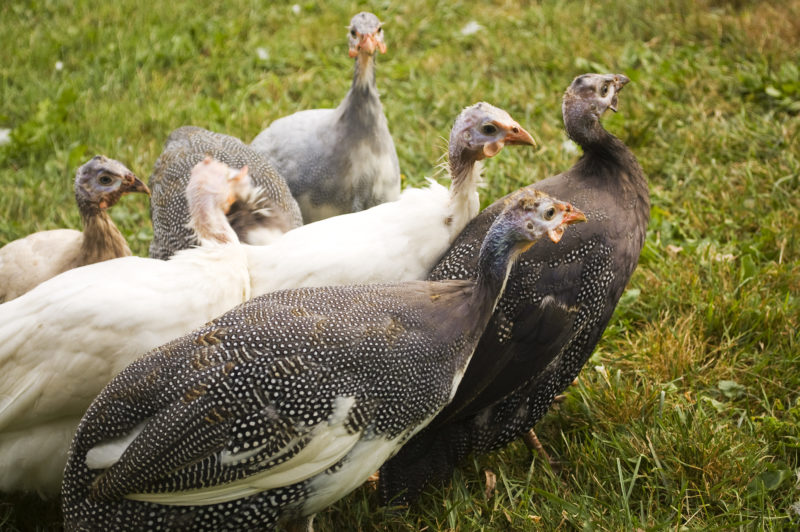
Why keep guineas? After all, they’re so strange-looking that one of the men who delivered our dishwasher refused to get out of the truck.
His partner had to lug the appliance in on his own, clasped in brawny arms, while glancing nervously over his shoulder. He admitted that they both were city guys, so any of our free-ranging farmyard fowl may have freaked them out. But guineas—with their white “masks” and their habit of running full speed at vehicles—seem especially equipped for that purpose!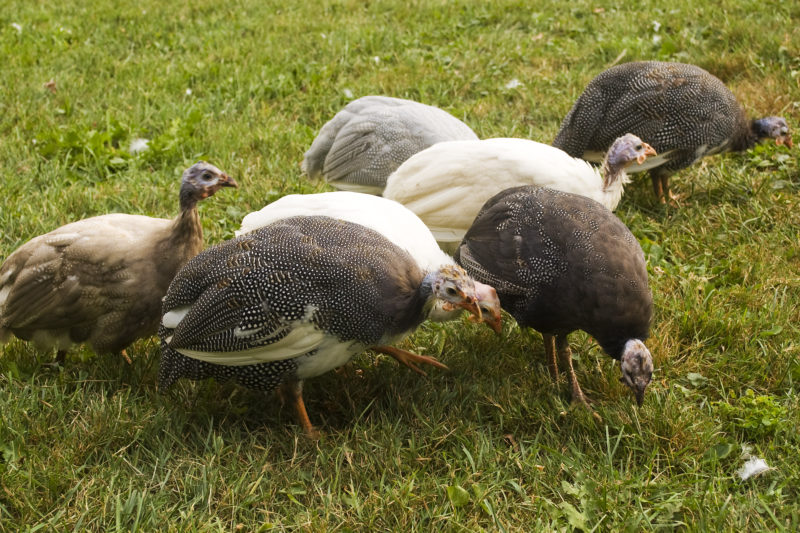
Watching Like a Hawk for a Hawk
Guineas scream their pointy little heads off when something alarms them, which could theoretically make them good watchdogs, as long as they roost close to the house. Ours usually hang out in the barn at night, which is just as well, since their raucous chorus in the wee hours wouldn’t improve our dispositions.
I actually had young guineas in a cage outside my bedroom window for a while one summer, and don’t recall them sounding off much after darkness fell, so their reputation as watchdogs may be exaggerated. But I did keep the top of their cage covered while they were roosting, which might’ve made a difference.
During the daylight hours, guineas keep an eye on the sky, when not bent on bug patrol, and will shriek a warning when they spot a hawk. That fuss may give other barnyard birds and the wild ones at the feeder time to flee to safety, provided that those other birds understand “guinea-ese!”
A female guinea may actually take on the predator, if necessary, to protect her keets. When my elderly father was a boy, he once saw a bristling hen jump to meet a hawk in midair. As he recalls, feathers flew, and the hawk wisely did also. Speaking of nature red in beak and claw, guineas reputedly will attack rodents and snakes as well, but I’ve never seen them do so.
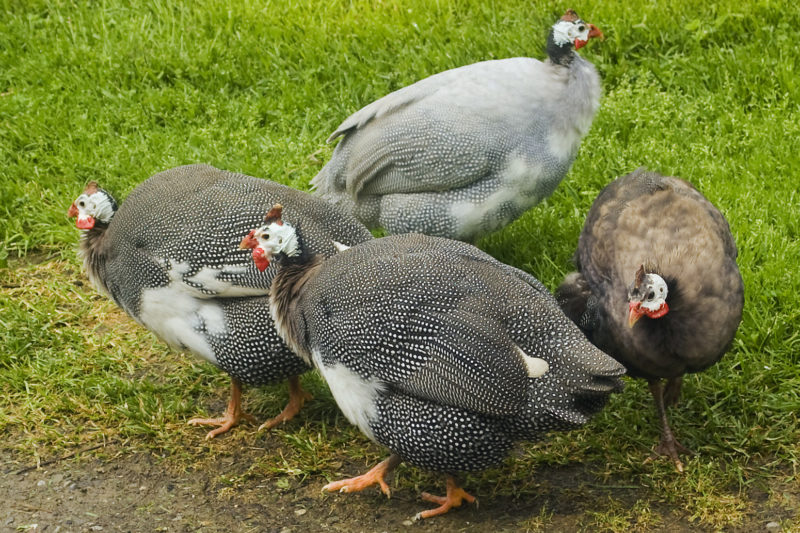
Beating Chickens at the Game
My father also remembers that his family occasionally ate some of their guineas back in Depression and post-Depression days. The hard-to-catch birds usually had to be shot from a distance, as if they were game birds.
Like the meat of game birds, guinea flesh has less fat than that of chicken. It’s also high in amino acids, so guineas may help protect your health too!
Now that science has discovered what most of us country people knew all along—that eggs actually can be good for us—you theoretically could eat your guinea eggs. However, although guineas are supposed to lay from about mid-spring to mid-autumn, you couldn’t prove that by us. We generally don’t find their hidden nests until after they’ve amassed a considerable pile of eggs. Provided that a possum hasn’t cleaned them out first, we usually leave those eggs in place in hopes that one of the hens will be ambitious enough to hatch a few.
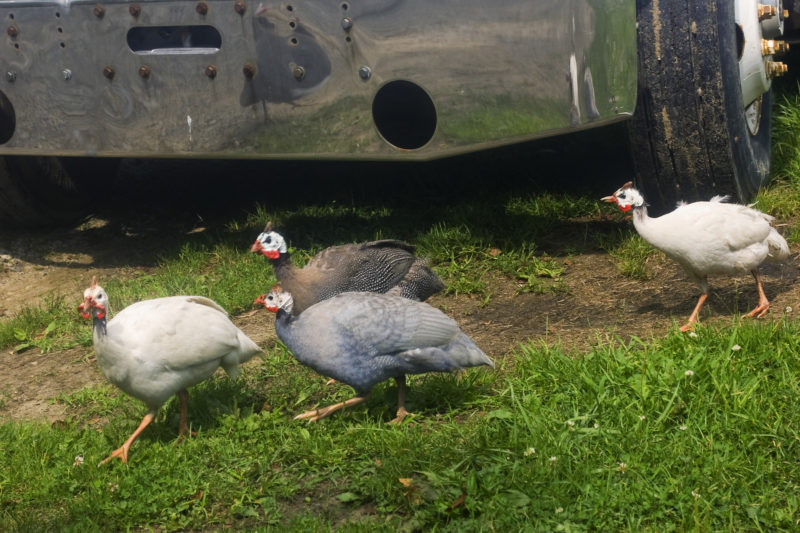
Ticking Off the Ticks
Guineas are generally well-behaved in the garden, though I’ve found that they’ll occasionally nip at daffodil buds early in the spring, and at tomato fruits when they’re thirsty. But they make up for that by their consumption of Japanese beetles and other insects.
The main reason we— and an increasing amount of other people—keep guineas can be summed up in one word: ticks. Lyme disease has people in our section of the country running scared, and for good reason. A single infected blacklegged tick bite, if untreated, may give any one of us pain in the head, neck, or joints, or potentially neurological and heart problems. Antibiotics may prevent or cure the disease if the bite is detected early enough, but some people are afflicted with post-treatment Lyme disease syndrome, which can persist long afterward. You can learn about the others diseases different varieties of ticks may carry at the Centers for Disease Control and Prevention.
Although guineas do have a voracious appetite for bugs, they’re most likely to find adult ticks, while those that cause Lyme disease generally still are in the tiny nymph stage. However, any adult ticks that become guinea gorp won’t be making more babies, which has to help.
Stealing the Show by Showing Up
As has been proved recently, pets have a therapeutic effect on their owners’ health. Most of our birds probably qualify as pets, since we keep them mainly for their egg and entertainment value. Our guineas offer lots of the latter, since they’re just fun to watch — as are the expressions of people who have never seen them before!
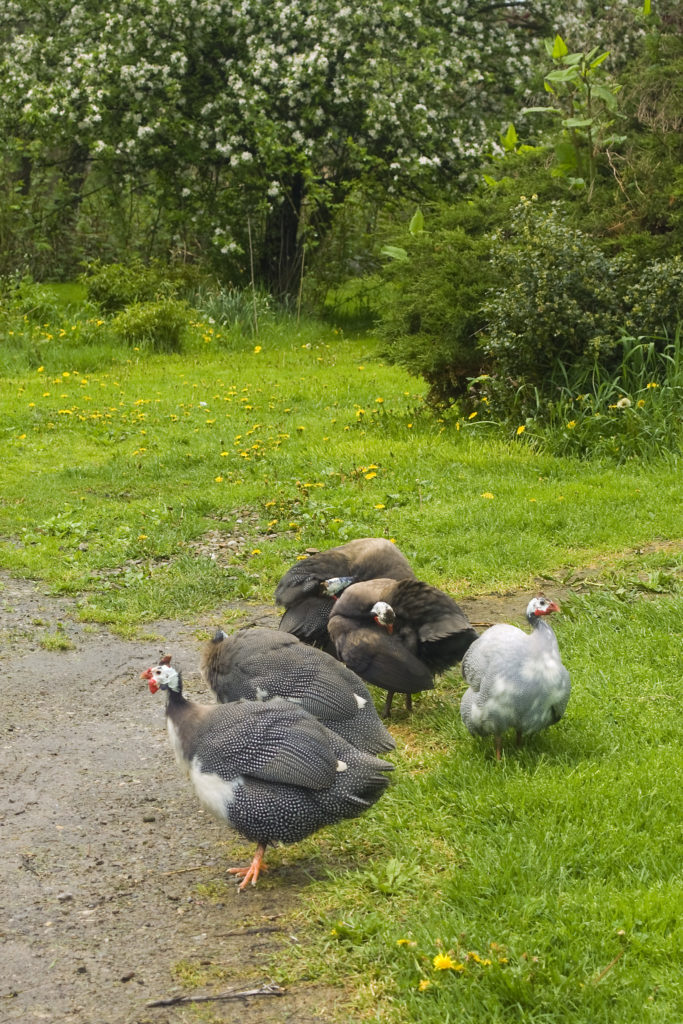
Helping Your Guineas Help You
Your guineas obviously will need to be free-ranging rather than cooped up to be successful at tick-picking and hawk-squawking. Granted, those that aren’t protected will be more vulnerable to predators, both foreign and domestic! You may be able to compromise by keeping them indoors at night and releasing them during the day, provided you can convince them to return to a coop in the evening.
Speaking of domestic threats, our largest dog likes to run through the flock occasionally. Fortunately, our birds usually have enough trees or buildings around that they can fly up to a limb or roof to escape.
I don’t think our mutt would kill them, as she hasn’t yet killed the duck who likes to chase her, but her ancestry appears to include mostly herding breeds. Should your dogs be hunting types, either by breed or inclination, you’ll need to train them to leave your barnyard birds alone.
If you grow your own vegetables, you probably should avoid feeding any to your guineas, since you don’t want them to see the ones in the garden as a smorgasbord. But I do give penned keets nutritious weeds, such as dandelions and purslane, since I won’t mind at all if they help me with the weeding once they’re released!
Audrey is the author of the “Thyme Will Tell” series of gardening-related mysteries, one of which received a starred review in Booklist and another a Top Pick from Romantic Times. Her e-book of humorous rural romances is titled Love and Other Lunacies. She lives on a small farm in western Pennsylvania.













6 Comments
Hi Robynne,
I do have quite a tick problem at the moment with my lot so this is very useful info for me. I really liked your other post on egg shapes and calcium deposits etc, you know so much!
Take care and stay safe
Jane
Thank you do much for this info about guinea fowls….we are in the process of completing our chicken pen and the idea of having of having guinea fowls is so exciting! But here in France the attitude about those lovely and quirky birds is so different from you Americans: the French do not understand having them for their own sake. The French eat them, and that is that. So any information concerning those animals only relates to how to raise them in order to eat them….sad.
Thanks, Suzanne and Mina, for your comments. We are getting some coyotes here in PA too, Suzanne, so it’s nice to know that the guineas can fight back! I’m afraid I can’t give you much advice, Mina, since I’ve always used an incubator rather than a hen to hatch our guinea eggs, but it sounds as if a hen worked well for Suzanne. In your case, I probably would choose the hen who is in a separate coop.
I don’t recall either adult guineas or adult chickens ever attacking our keets, so I don’t think you need worry about that. One of our ducklings did try to keep the keets in line by pecking at them, but he may just have been establishing pecking order since he was raised with them.
Hens, as in chickens, usually are good at keeping little ones warm. Guinea hens can be more careless and occasionally leave some of theirs behind or make the mistake of leading them through wet grass.
Our free-ranging guineas have tended to stick to their own flocks, even staying separate from other guineas who weren’t raised with them, but that was easy for them to do since they weren’t in coops. When we only had a single old one left, though, he was eager to join up with the new group of young ones. Although they would run from him at first, they eventually accepted him.
If you have any problems after the eggs hatch, you probably could take some of the keets away from the hen and keep them in a protected location. I hope it all turns out well for you!
Question re: guinea keets and raising them with a broody hen:
I have a flock of only 4 guineas due to woefully inadequate planning last year. I also have 3 males with only one female. The female has laid 2 eggs and left them on the floor of their coop but she has shown no signs of wanting to put them together and nest with them; she has laid no eggs in the last 5 days. I absolutely need to get more guineas for this tiny flock because they have insufficient numbers to keep everyone happy and to fulfill all the necessary roles they have. I have ordered fertilized guinea eggs which will arrive in a few weeks. A couple of my hens are broody so it might be an option to put the eggs under them.
One hen lives in her own separate coop but the rooster stays with her at night- will he hurt the new keets or assume they are his?
The other lives in a group of 11 hens with some very forceful personalities (she is the second in the pecking order). Will the other hens try to hurt the keets just because they aren’t theirs? They all seem to like to sit on everyone’s eggs in turn.
I don’t know how many eggs one hen can sit on and I also don’t know if the moms will be able to keep the keets sufficiently warm when they hatch in early July.
MOST importantly, will the existing adult guineas accept the little guys if they encounter them outside with a hen? They were raised by one of the hens I’m speaking about but I don’t know how they would take to a new set of keets wandering around outside, particularly with a hen in tow. I need the guineas to all get along so they can make a sufficient flock.
Sorry for so many questions but the more I thought about the eggs, the more concerned I became about these issues. Thanks-
My guinea flock is a mix of colors, just like the above pictures. This spring, I’ve watched them escort 3 coyotes off the property. The nine of them circle the coyote and scream bloody murder. The coyote is so flummoxed it finally runs away. I’ve always hatched fertilized guinea eggs under a good broody hen. Years later, they still follow her around. They’re very loyal. And a hawk? One squawk and the chickens fly under the bushes. Hawks have to stick to the field gophers on my farm!
Thanks for the great info, Audrey!
Quesion regarding training dogs to leave them alone: I adore both of my dogs (both are 50-lb mutts), but the female is a known chicken-killer. My male has been wonderful with the keets, and now that they’re grown, I assumed he would be okay with them. Nope, he turned into a dog I didn’t know existed the past seven years, and chased one over and through two electric fences and into the woods. The sounds that came from the killing were heartbreaking.
How do I train my dogs to leave the Guineas alone? My only options now are to tie up the dogs all day if I let the Guineas out, or keep the Guineas locked up in the coop, which totally defeats the purpose of having them.
Can you please offer some suggestions?